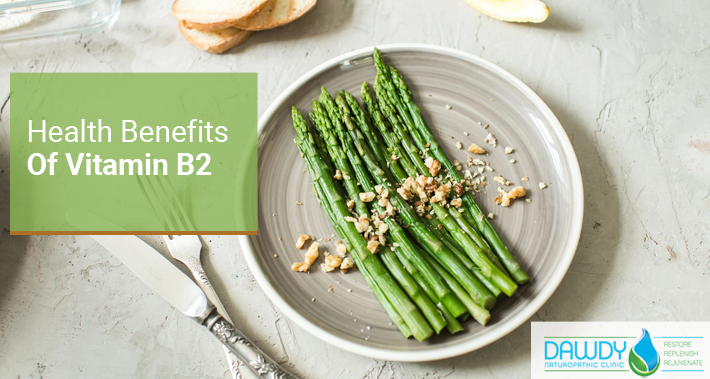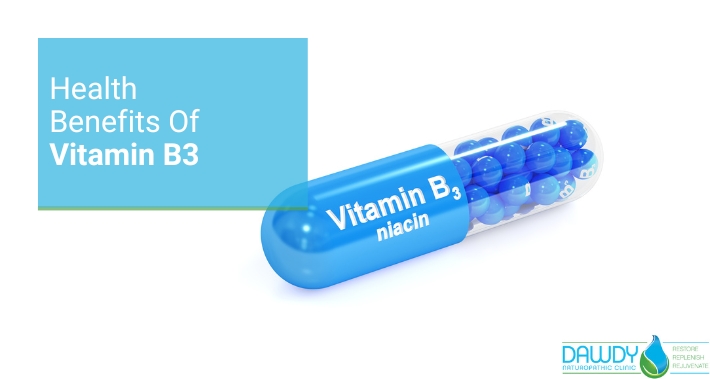Health Benefits Of Vitamin B2
Vitamin B2, also known as riboflavin, plays numerous important roles in many of your body’s processes.
It can act as an antioxidant, as well as aid in maintaining your body’s supply of energy.
It converts proteins, fats, and carbohydrates into nutrients that your body needs and uses for energy.
Vitamin B2 has several other potential health benefits that may benefit you.
I’m Dr. Kimberly Dawdy, ND, and at my Ottawa area naturopathic clinic I often talk about the importance of vitamins and nutrients to my patients.
Recently, we’ve been exploring each nutrient, one by one, for our readers.
So far, we’ve covered:
Today, we’re continuing that series with vitamin B2.
So let’s take a look at what vitamin B2 is and its potential benefits to your health and well being.
What Is Vitamin B2?
Vitamin B2, or riboflavin, is an essential, water soluble, B vitamin.
It’s part of the B complex vitamins, which work to help maintain your body’s various functions.
Your body is limited in the amount of vitamin B2 that it can store, so you need to consume a daily supply of it through foods rich in vitamin B2 or through supplements.
The majority of riboflavin is absorbed in your small intestine.
What Are Vitamin B2’s Benefits?
Vitamin B2 is involved in a number of your body’s functions.
Beyond that, it may provide numerous other potential health benefits.
Let’s take a closer look at how vitamin B2 may help you.
1. It Plays An Important Role In Managing Your Body’s Energy
One of the main functions of vitamin B2 is to turn food into energy.
This allows your body to maintain proper digestive, hormone, nerve, and brain function.
The type of energy, or fuel, that is created through riboflavin is known as ATP, or adenosine triphosphate.
Your body uses vitamin B2 to break down proteins, fats, and carbohydrates into nutrients needed for energy to maintain various bodily functions.
ATP not only produces energy for your body to use when needed, but is also responsible for storing energy in your muscles.
Furthermore, vitamin B2 helps to calm the nervous system.
By fighting against stress and regulating hormones associated with mood, energy, appetite control, and more, it can help to maintain a healthy metabolism
2. It May Help With Cataracts
Cataracts occur when the natural lens of your eye becomes cloudy, which can cause blurry, hazy, and less saturated vision.
It’s a condition that’s commonly found in elderly people.
Vitamin B2, or riboflavin, may help combat the development of eye disorders, such as cataracts.
It may benefit eye health by helping the retina receive light.
A potential treatment option involves putting drops of riboflavin on the cornea, allowing the vitamin to penetrate it and help strengthen it.
3. It May Help With Migraines
A migraine is a type of severe recurring headache that’s characterized by throbbing or pulsating pain.
Additional symptoms may include nausea, dizziness, and sensitivity to light.
Vitamin B2 can potentially reduce oxidative stress, which may have an association with the development of migraine episodes.
As such, it may help prevent headaches and recurring migraine episodes.
Taking vitamin B2 supplements, particularly if you have a deficiency, may decrease the duration, frequency, and severity of migraines.
4. It May Help Relieve Carpal Tunnel Syndrome
Carpal tunnel syndrome is a commonly occurring neurological disorder.
It affects the median nerve, which runs between the palm of your hand and your forearm.
Carpal tunnel syndrome can lead to feelings of weakness, numbness, and pain in the hand and wrist.
Vitamin B2 may offer some protection against some neurological disorders.
It may help relieve symptoms associated with carpal tunnel syndrome due to this potential neuroprotective effect.
It’s possible that vitamin B2 may have an impact in impaired neural pathways, which can help relieve the effects of neurological disorders, such as carpal tunnel syndrome.
5. Other Benefits Of Vitamin B2
Aside from the potential health benefits of vitamin B2 listed above, it may provide additional health benefits as well.
Vitamin B2 may help boost your heart health.
A buildup of homocysteine, an amino acid that can be found throughout your body, in your blood can lead to narrowed arteries and an increased risk of heart disease.
Riboflavin regulates your levels of homocysteine, which can directly impact your heart health.
Vitamin B2 may also help prevent anemia.
Anemia is a condition characterized by a decreased production of red blood cells, often caused by iron deficiency.
Vitamin B2 is one of the components needed for red blood cell production.
It also helps bring oxygen to the cells, as well as mobilize iron, which is needed to form hemoglobin, an essential part of red blood cells.
Vitamin B2 also has antioxidant properties that may benefit your immune system by fighting against free radicals in your body.
It’s used to create an antioxidant known as glutathione, which helps detox the liver and destroy free radicals, which are associated with the development of various types of cancer.
RELATED: Antioxidants, Explained In Simple Terms
Through its ability to maintain collagen levels, vitamin B2 can also help keep your hair and skin healthy.
What Foods Are High In Vitamin B2?
Vitamin B2 can be found in a variety of foods such as, meat, dairy, vegetables, nuts, legumes, and fortified whole grains.
Foods that are high in vitamin B2 include:
- Milk
- Yoghurt
- Feta cheese
- Salmon
- Beef liver
- Turkey
- Beef
- Chicken
- Lamb
- Eggs
- Whole grain breads
- Enriched breads
- Fortified cereals
- Lentils
- Quinoa
- Almonds
- Spinach
- Sweet potatoes
- Kelp
- Kidney beans
- Lima beans
- Asparagus
- Artichokes
- Cruciferous vegetables (broccoli, brussel sprouts)
- Avocados
- Mushrooms
- Pumpkins
- Nuts
What Does Vitamin B2 Deficiency Look Like?
Having a vitamin B2 deficiency, also called ariboflavinosis, can significantly impact your health.
Deficiency occurs either because of a poor diet that’s lacking in vitamin B2, or because of another reason, such as excessive alcohol use, that decreases your body’s ability to absorb it.
Some common symptoms of vitamin B2 deficiency include:
- Dry or scaly skin
- Cracked lips
- Swollen tongue
- Sore throat
- Iron deficiency anemia
- Sensitive or irritated eyes
- Weakness
- Mouth ulcers
- Cracks in the corners of the mouth
- Redness in the lips, mouth, and throat
- Weakness
Can You Overdose On Vitamin B2?
Vitamin B2 is generally considered safe, with minimal risk of overdosing or toxicity.
It’s a water soluble vitamin, meaning that any excess amounts of it in your system are expelled through your urine.
While there is minimal risk of an overdose, taking other medications may impact your body’s ability to absorb vitamin B2.
Some of these medications can include:
- Methotrexate, used as an immunosuppressant to treat autoimmune disorders
- Phenytoin, used to treat epilepsy
- Thiazide diuretics, used to treat high blood pressure
- And others
Some medications can increase your absorption of vitamin B2, increasing risk of toxicity.
Others can decrease it, increasing risk of deficiency.
Make sure to discuss any prescription medications you’re talking with your naturopathic doctor.
Book Your Appointment With Dawdy Naturopathic Today
Vitamin B2 is an essential vitamin that plays a role in a number of your body’s functions and processes.
If you have any questions about vitamin B2, or any other vitamins or nutrients, I can help.
I’m Dr. Kimberly Dawdy, ND, and I will work with you to optimize your vitamin levels so that you can live a healthier life.
Book your appointment with Dr. Kimberly Dawdy, ND, today.
Yours in Health,
Dr. Kimberly Dawdy, ND
Dawdy Naturopathic Clinic
6899 Sunset Blvd,
Greely, ON K4P 1C5
-https://g.page/dawdynaturopathicclinic
Dawdy Naturopathic Clinic offers a variety of naturopathic health solutions for individuals and families in Ottawa and the surrounding area.





